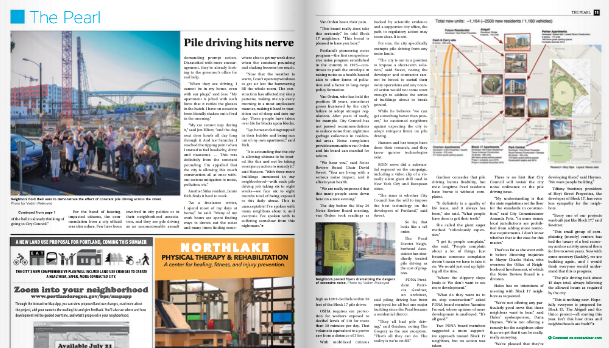
Stan in the media
My View: Police reforms need a more reasoned approach by everyone
“One of the primary responsibilities of government at any level is to provide a safe environment for its population. In the past year, our city has reduced the Portland Police Bureau budget by $27 million and is seeking a 5% reduction across all bureaus in the next fiscal year, including the police.”
My View: Send Civic Life back to the drawing board
“Portland's Civic Life Bureau Director Suk Rhee expresses a heartfelt conviction about equity and inclusion in Portland. As one of many neighborhood association leaders, we couldn't agree more with the aspirational values of this being a city where opportunities for civic engagement should abound for everyone.”
‘Last 5 years at Navigation Center has been hell’
Stan Penkin, the president of the Pearl District Neighborhood Association, has mixed feelings about the future of this shelter. He said they’d need a stronger ‘good neighbor agreement’ going forward.
What We Can Do to Help Reduce Loneliness
In recent weeks, Mr. Kristof and Ms. Cottle have written convincingly about the problems of loneliness and isolation and the need for more flexible housing options as our population ages. In neither piece was there any mention of the option of home sharing, which is a low-cost and immediate means of aiding the housing crisis for both young and old.
At Home Share Oregon, a nonprofit based in Portland, we connect homeowners who have spare rooms — many of whom are mortgage-burdened, lonely and living on meager Social Security checks — with renters struggling to find a home.
While our mission is to help alleviate the affordable housing crisis by utilizing a large untapped inventory and preventing homelessness before it starts for both owners and renters, our program also assists those who are lonely and isolated and who benefit from the social interaction that comes with home sharing.
There was a time when boardinghouses were part of the cultural norm and helped bring people together. Over time that became stigmatized. We are working to change the cultural norm by moving forward with a proven means of housing people while at the same time building financial resilience and combating the loneliness epidemic.
House Committee On Climate, Energy, and Environment HB2396
The Pearl District Neighborhood Association asks for your support of HB2396, under the Climate, Energy, and Environment Committee. We feel strongly about the progress of this bill because the World Health Organization has identified air pollution as the single greatest threat to human health globally. According to the University of Chicago Air Quality Index, Oregon is the second most polluted state in the nation.
Noise Review Impact Hammer
As the impact hammer pile driver reverberates throughout the North Pearl at Hoyt Street’s Block 20 project, the Noise Review Board (NRB) met on November 9th to discuss a proposal that would reduce the harmful effects of this antiquated method.
Broad defunding is not what we need for police reform
Gun violence is on the rise, and homicides in Portland spiked in July to a 30-year record. While such violence is increasing nationally, the timing could not have been worse, coinciding with Portland City Council’s “defunding” of Portland Police’s Gun Violence Reduction Team.
Happy birthday, Street Roots
One thing was truly shared between the poets and the audience: a lot of palpable emotion. It veered from sadness to anger to joy; from disbelief to curiosity to relief, when the poems covered experiences we are all familiar with, that we share aspects of the world. Tears and laughter were openly displayed, helping to forge a sense of community in a group of people from backgrounds all over the map. The hospitality of Gallery 114 and the welcoming remarks by Stan Penkin, president of the Pearl District Neighborhood Organization, were appreciated by all as well.
Pearl Livability Summit: Leaders, neighborhood association to talk homelessness, crime
Penkin says the growing problems are not because of the homeless population, as some may think.
"I think a lot of people look to the homeless situation as the cause of all our problems, but it's not, but it's one piece of it," Penkin said. Instead, Penkin says the trash, the crime, the graffiti and the homelessness problems are the result of a growing city.
Portland needs more transparency from citizen advisers: Guest opinion
Guess what's illegal in Seattle, San Francisco, Los Angeles and San Diego? Voting to give yourself millions while serving on a city advisory committee. Yet, it's currently legal in Portland to vote on your own or your client's financial interests while serving on a city advisory committee. Portland City Council must make this illegal by requiring advisory committee members to recuse themselves from voting on their own or their clients' financial interests.
Readers respond: Stop homelessness before it starts
The lack of affordable housing in Oregon is a crisis that puts people at risk of displacement. A recent OPB article showed that more than half the state’s renters don’t have enough money for other basics after paying rent. A major reason is the state’s limited inventory of rental units.
As efforts continue to build new housing and increase rental assistance, home sharing is a commonsense response.
Climate change
Your December 21st editorial space devoted to rationalizing why The Oregonian editorial board won’t have "climate change" as a 2015 "editorial agenda" item could have been put to better use by discussing instead why this is an important issue that all media at any level should be talking about.
Pile driving hits nerve
Pile driving hits a nerve Noisy construction projects in Pearl spur neighbors to organize, but being heard in City Hall is an uphill climb. ALLAN CLASSEN pile driving isn’t new to the Pearl District, where in recent years the construction of tall buildings on soft ground has usually involved jarring intervals of steel-on-steel pounding. But the latest round of pile driving has somehow struck a chord. Residents near a 16-story building going up on Block 17 (surrounded by Northwest Overton, Pettygrove, 11th and 12th streets) are fed up and not taking it quietly. And they’re organized.
Eight overdosed on fentanyl in the Northwest Portland park blocks
Leaders in the community, like Stanley Penkin of the Pearl District Neighborhood Association, said more needs to be done about behavioral health.
“We need our all our government entities from federal, state, local to come together and really have true and real plans to come up with solutions for our behavioral health problems, of which the addiction crisis is a big part of it,” Penkin said.
Private, public partnerships critical for lasting solutions to homelessness
How often do we walk down the street and see an unfortunate person sleeping on the street? Sadly, too often these days. But what do most of us do? What do we think? We may feel sad and sympathetic, but we move on with our lives as a momentarily visible person quickly becomes invisible.
The arts tax story that's not being told
OK Oregonian. We get that you don't like the Arts Education and Access Fund (AEAF), or the arts tax as it's commonly known. It's time to get over yourselves and to acknowledge the undeniable positive impacts of this innovative, voter-approved fund.
Your headlines and skewed coverage do a good job of feeding negative perceptions of government, but a poor job of telling the story of what the arts tax has already done for our children and arts organizations throughout our city.
Protect city’s livability, quality of life
Crossing the great divide of the Hudson River some 12 years ago, I was leaving behind the bright lights of Broadway, the memories of traffic backups at every turn, graffiti-laden subway cars on my rides up to the Columbia University campus, the incessant noise of honking vehicles and the constant din of New York self-importance.
With anxiety at leaving my place of birth and home for 60 years, we were heading to the promised land of Portland, a place I sadly later learned no longer had covered wagons.
Nevertheless, we were enamored with the laid-back quality of life, the attention to the details of everyday urban life and the polite gentility of everyone we met, even the homeless man who apologized for smoking as I walked by him on the street. Upon arriving we never looked back and were happy and proud to call ourselves Portlanders. It felt safe and comfortable wherever we went through the streets of Portland.
My View: Why we should ban gas leaf blowers
Every doctor affiliated with Mt. Sinai Children's Hospital's Environmental Health Center signed on to New York's proposed total ban, stating: "Leaf blowers pose multiple hazards to human health … Children are the most susceptible members of our population to these hazards ... and thus their lungs, ears, eyes, and other organ systems are inherently more sensitive to environmental hazards than the organs of adults."
Portland's current leaf blower regulations, adopted in 2001, address only decibel levels and hours of operation, but the issue is considered a low priority and there is currently no active enforcement of even those.
But we can change that. Due to heightened understanding of the unique risks poor air quality poses to Portland metro area residents, the city of Portland and Multnomah County undertook a regional project to look at local actions that can be taken to improve air quality. Local government could incentivize the transition to readily available new technologies of electric powered blowers that not only eliminate the emissions, but are quieter than the current gas powered equipment. This would be low-hanging fruit and demonstrate real progress to improving our neighborhood air quality.















